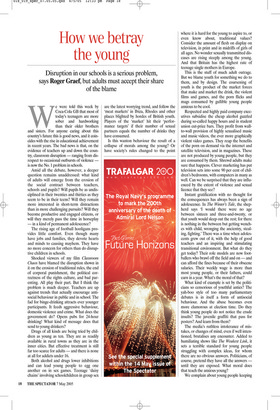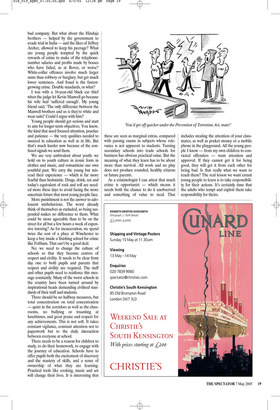How we betray the young
Disruption in our schools is a serious problem, says Roger Graef, but adults must accept their share of the blame We were told this week by Coca-Cola GB that most of today’s teenagers are more sober and hardworking than their older brothers and sisters. For anyone caring about this country’s future this is good news, and it coincides with the rise in educational achievement in recent years. The bad news is that, on the evidence of teachers up and down the country, classroom disruption — ranging from disrespect to occasional outbursts of violence is now the No. 1 problem in schools.
Amid all the debate, however, a deeper question remains unaddressed: what kind of adults will emerge from the erosion of the social contract between teachers, schools and pupils? Will pupils be as undisciplined in their twenties and thirties as they seem to be in their teens? Will they remain more interested in short-term distractions than in more challenging pursuits? Will they become productive and engaged citizens, or will they merely pass the time in horseplay — in a kind of permanent adolescence?
The rising age of football hooligans provides little comfort. Even though many have jobs and families, they devote hearts and minds to causing mayhem. They have no more concern for others than do disruptive children in schools.
Shocked viewers of my film Classroom Chaos have blamed the disruption shown in it on the erosion of traditional rules, the end of corporal punishment, the political correctness of the rights culture, and bad parenting. All play their part. But I think the problem is much deeper. Teachers are up against trends that actually encourage antisocial behaviour in public and in school. The fad for binge-drinking attracts ever younger participants. It feeds aggressive behaviour, domestic violence and crime. What does the government do? Opens pubs for 24-hour drinking! What kind of message does that send to young drinkers?
Drugs of all kinds are being tried by children as young as ten. They are as readily available in rural towns as they are in the inner cities. But effective treatment is still far too scarce for adults — and there is none at all for addicts under 16.
Both alcohol and drugs lower inhibitions and can lead young people to egg one another on in sex games. Teenage ‘daisy chains’ involving schoolchildren in group sex are the latest worrying trend, and follow the ‘meat markets’ in Ibiza, Rhodes and other places blighted by hordes of British youth. Players of the ‘market’ hit their ‘performance targets’ if their number of sexual partners equals the number of drinks they have consumed.
Is this wanton behaviour the result of a collapse of morals among the young? Or have society’s rules changed to the point where it is hard for the young to aspire to, or even know about, traditional values? Consider the amount of flesh on display on television, in print and in midriffs of girls of all ages. No wonder sexually transmitted diseases are rising steeply among the young. And that Britain has the highest rate of teenage single mothers in Europe.
This is the stuff of much adult outrage. But we blame youth for something we do to them, and by design. The coarsening of youth is the product of the market forces that make and market the drink, the violent films and games, and the porn flicks and mags consumed by gullible young people anxious to be cool.
Respected and highly paid company executives subsidise the cheap alcohol guzzled during so-called happy hours and in student union cut-price bars. They profit from wallto-wall provision of highly sexualised music and music videos, the ever more graphically violent video games. They reap the benefits of the porn on demand via the internet and satellite television, and in magazines. These are not produced by young people, but they are consumed by them. Shrewd adults make sure that happens. Clever marketing has put television sets into some 90 per cent of children’s bedrooms, with computers in many as well. Can we be surprised that they are influenced by the extent of violence and sexual licence that they see?
Instant gratification with no thought for the consequences has always been a sign of adolescence. In The Winter’s Tale, the shepherd says ‘I would there were no age between sixteen and three-and-twenty, or that youth would sleep out the rest; for there is nothing in the between but getting wenches with child, wronging the ancientry, stealing, fighting.’ There was a time when adolescents grew out of it, with the help of good teachers and an inspiring and stimulating transitional environment. But what do they get today? Their role models are now footballers who brawl off the field and on — and can afford the fines because of their obscene salaries. Their weekly wage is more than most young people, or their fathers, could earn in a year. What’s the moral of that?
What kind of example is set by the politicians so censorious of youthful antics? The yah-boo style of too many parliamentary debates is in itself a form of antisocial behaviour. And the abuse becomes even more clamorous at election time. Do they think young people do not notice the crude insults? The juvenile graffiti that pass for posters? And learn from them?
The media’s ruthless intolerance of mistakes, or changes of mind, even if well intentioned, brutalises any encounter. Added to humiliating shows like The Weakest Link, it sets a terrible standard for young people struggling with complex ideas, for whom there are no obvious answers. Politicians, of course, pretend they have all the answers until they are exposed. What moral does that teach the anxious young?
We complain about young people keeping bad company. But what about the Hinduja brothers — helped by the government to evade trial in India — and the likes of Jeffrey Archer, allowed to keep his peerage? What are young people tempted by the quick rewards of crime to make of the telephonenumber salaries and profits made by bosses who have failed, as at Rover, or worse? White-collar offences involve much larger sums than robbery or burglary, but get much lower sentences. And fraud is the fastestgrowing crime. Double standards, or what?
I was with a 16-year-old black car thief when the judge let Kevin Maxwell go because his wife had ‘suffered enough’. My young friend said, ‘The only difference between the Maxwell brothers and us is they’re white and wear suits!’ Could I argue with him?
Young people should get serious and start to aim for longer-term objectives. You know, the kind that need focused attention, practice and patience — the very qualities needed to succeed in education as well as in life. But that’s much harder now because of the confused signals we send them.
We are very ambivalent about youth: we hold on to youth culture in iconic form in clothes and music, and romanticise our own youthful past. We envy the young but misread their experience — which is far more fearful than hedonistic. Drugs, drink, sex and today’s equivalent of rock and roll are needed more these days to avoid facing the more uncertain future that most young people face.
More punishment is not the answer to adolescent misbehaviour. The worst already think of themselves as excluded, so being suspended makes no difference to them. What could be more agreeable than to be on the street for all but a few hours a week of expensive tutoring? As for incarceration, we spend twice the cost of a place at Winchester to keep a boy inside a finishing school for crime like Feltham. That can’t be a good deal.
No; we need to change the culture of schools so that they become centres of respect and civility. It needs to be clear from day one to both pupils and parents that respect and civility are required. The staff and other pupils need to reinforce this message constantly. Many of the worst schools in the country have been turned around by inspirational heads demanding civilised standards of their staff and students.
There should be no halfway measures, but total concentration on total concentration — quiet in the corridors as well as the classrooms, no bullying or truanting at lunchtimes, and great praise and respect for any achievements. This is not soft. It takes constant vigilance, constant attention not to paperwork but to the daily interaction between everyone at school.
There needs to be a reason for children to study, to do their homework, to engage with the journey of education. Schools have to offer pupils both the excitement of discovery and the mastery of skills, and a sense of ownership of what they are learning. Practical tools like cooking, music and art will change their lives. It is interesting that these are seen as marginal extras, compared with passing exams in subjects whose relevance is not apparent to students. Turning secondary schools into trade schools for business has obvious practical value. But the meaning of what they learn has to be about more than survival. All work and no play does not produce rounded, healthy citizens or future parents.
As a criminologist I can attest that much crime is opportunist — which means it needs both the chance to do it unobserved and something of value to steal. That includes stealing the attention of your classmates, as well as pocket money or a mobile phone in the playground. All the young people I know — from my own children to convicted offenders — want attention and approval. If they cannot get it for being good, they will get it from each other for being bad. Is that really what we want to teach them? The real lesson we want errant young people to learn is to take responsibility for their actions. It’s certainly time that the adults who tempt and exploit them take responsibility for theirs.




























































 Previous page
Previous page